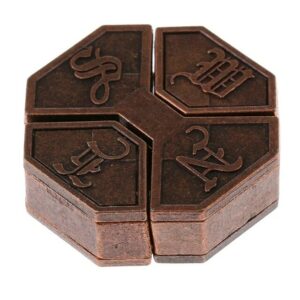Chinese puzzle box
Writing again under the pseudonym Joanna Field, Marion Milner wrote ‘An Experiment in Leisure’, originally published in 1937, where she looked at what she called ‘the everyday problem’ of what to do with one’s spare time. For some there’s no problem – these are the people who are quite sure who they are, and who have definite clear-cut opinions about everything. For others who are less certain it’s ‘fatally easy to live parasitically upon other’s people’s happiness’ – in other words relying on someone else to decide. This she sees as a form of masochism, one often experienced by women who (and probably more so in the 1930s), curbed their own desires to suit others, leading to what she calls self-abasement – putting herself down and encouraging feelings of inferiority.
Milner decided to look initially at the memories of what she did in her spare time that kept coming to mind – memories from her whole life, both good and bad, that she couldn’t get out of her head. There is much detail from her early interest as a child in nature; throughout she followed the psychoanalytic principle that there is no such thing as irrelevance – that the mind has concerns of its own that are often not identical with conscious purposes, and noting that leisure was once defined by an analyst as the process of looking at one’s impulses and allowing them.
In her experiment, Milner finds that amongst other things, in both her memories and observations, there was a continual recurrence of mythological and religious imagery.
‘All this year it’s been growing in my mind, the possibility that the Gospel story is concerned … not with what one OUGHT to do, because someone (God, father) expects it of you, but with practical rules for creative thinking, a handbook for the process of perceiving the facts of one’s own experience – and, of course, in this sense, with “salvation”, for it is ignorance and blindness which lead to the City of Destruction. And the central truth, is it that only by a repeated giving up of every kind of purpose, plunging into the void, voluntary dying upon the cross, can the human spirit grow, and achieve those progressive fusings of isolated bits of experience which we call wisdom, truth? … For the Gospel story is obviously a Chinese puzzle-box of meanings … Real wisdom only grows under the condition of utter loss of all sense of purpose, standard, ideal, or of being pleased with yourself for being at least partly on the way to your goal …’
Whilst the ‘old forms’ of religion are seen by many as no longer adequate to express our feelings about the universe, she thinks that rejecting religion as childish is a false maturity when our feelings remain even more infantile and distorted. She finds herself in a quandary seeing that many of the anxieties that clouded her leisure, could not be cured by trying to force herself back into accepting the tenets of the church –
‘… to do this seemed impossible, it would be going against my most vital impulses, impulses which were apparently less concerned with fixed creeds, than with the overarching truth of experience. And yet also I did not think I could safely ignore the churches, for they had certainly been the guardians of some of the imagery that I had found most potent.’
